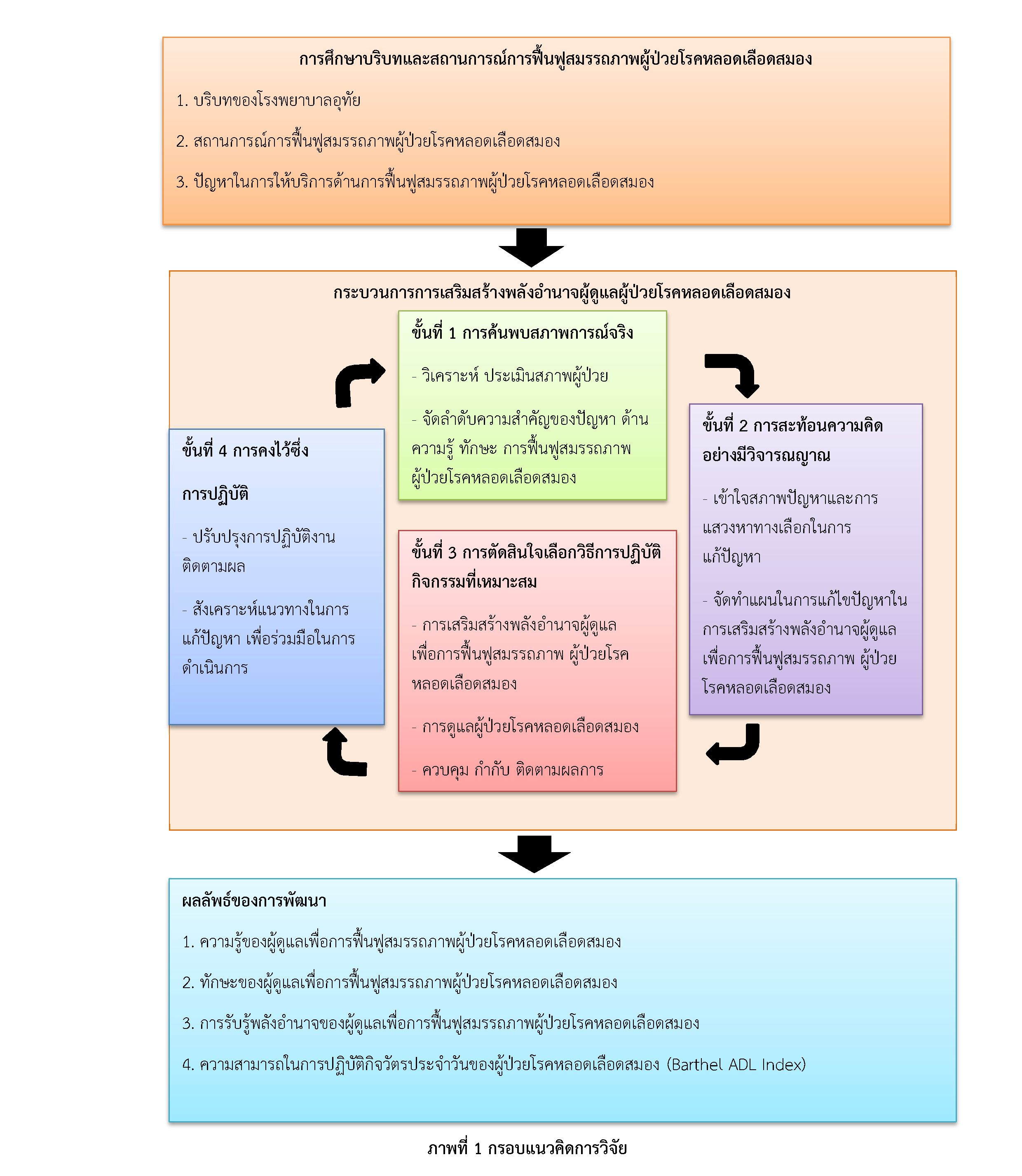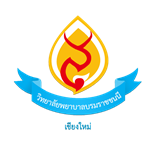The Empowerment of Caregivers on Rehabilitation for Stroke Patients in Uthai Hospital
Keywords:
Empowerment, Rehabilitation, Stroke CaregiversAbstract
This action research aimed to develop knowledge and skills of rehabilitation among stroke caregivers and to promote empowerment of stroke caregivers. This study was conducted during September to November 2021. There were three phases in this research procedure. Phase 1 was a situation analysis process regarding rehabilitation process in stroke patients. Phase 2 was to develop a self-empowerment program that proposed by the concept of self-empowerment (Gibson, 1993). Phase 3 was to evaluate the effectiveness of the program. Participants were 30 patient-caregiver pairs. Five research participants who developed the program were the head nurse of the department, two staff nurses, one physiotherapist, and one nurse from the sub-district health promotion hospital. The research tool was the caregiver empowerment program for stroke rehabilitation. The data collection instruments were: 1) an interview questionnaire for a situation analysis process; 2) the caregiver empowerment questionnaire for stroke rehabilitation; 3) the Barthel Index for Activities of Daily Living (ADL) assessment. Data were analyzed using descriptive statistics and paired sample t-test. The statistical significance level was set at the 0.05 level.
The results showed that after receiving the program, the mean score of knowledge about cerebrovascular disease, rehabilitation skills, and perceived empowerment of caregivers of stroke patients was significant higher than before enrolling the program (p-value<0.05). The ability to perform daily activities of stroke patients was also significant higher than before enrolling the program (p-value<0.05). Nurses and other health care providers can apply or develop this program to promote empowerment of caregivers on rehabilitation for patients with other chronic conditions.
References
กรมควบคุมโรค. (2564). รณรงค์วันอัมพาตโลก. สืบค้น 15 มีนาคม 2564. จาก https://ddc.moph.go.th/dir/news.php?news=10024&deptcode=dir.
จารุวรรณ ปิยหิรัญ. (2561). ผลของโปรแกรมการสร้างเสริมสมรรถนะแห่งตนของผู้ดูแลผู้ป่วยโรคหลอดเลือดสมอง. วิทยานิพนธ์พยาบาลศาสตร์มหาบัณฑิต (สาขาวิชาการพยาบาลเวชปฏิบัติชุมชน). มหาวิทยาลัยหัวเฉียวเฉลิมพระเกียรติ.
น้อมจิตต์ นวลเนตร์ และคณะ. (2555). อัมพาตครึ่งซีก: ท่านสามารถช่วยเขาได้. กรุงเทพฯ: สุขภาพใจการพิมพ์.
พัชราภรณ์ สิรินธรานนท์. (2558). ผลของโปรแกรมการสอนแนะผู้ดูแลต่อความสามารถในการปฏิบัติ กิจวัตรประจำวัน ของผู้ป่วยโรคหลอดเลือดสมองวัยผู้ใหญ่.วิทยานิพนธ์พยาบาลศาสตรมหาบัณฑิต (สาขาวิชาพยาบาลศาสตร์) จุฬาลงกรณ์มหาวิทยาลัย.
พิมพ์ชนก ปานทอง. (2560). การเสริมสร้างพลังอำนาจผู้ดูแลเพื่อการฟื้นฟูสมรรถภาพผู้ป่วยโรคหลอดเลือดสมอง โรงพยาบาลมหาราชนครราชสีมา. วิทยานิพนธ์พยาบาลศาสตรมหาบัณฑิต (สาขาการเวชปฏิบัติการชุมชน). มหาวิทยาลัยขอนแก่น.
สมนึก สกุลหงส์โสภณ, สิริวรรณ อนันตโชค และกฤษณี โหลสกุล. (2554). "ปัจจัยบางประการความสามารถในกิจวัตรประจำวัน และภาวะแทรกซ้อนในผู้ป่วยอัมพาตจากหลอดเลือดสมอง". วารสารการพยาบาลและการศึกษา, 4(2), 36-52.
สำนักงานสาธารณสุขจังหวัดพระนครศรีอยุธยา. (2563). รายงานสถิติสาธารณสุขประจำปี: สำนักงานปลัดกระทรวงสาธารณสุข กระทรวงสาธารณสุข.
อรพรรณ ฟูมณีโชติ. การให้การดูแล (caring of the caregiver). สืบค้น 15 มีนาคม 2564. จาก https://meded.psu.ac.th/binla/class04/388_441/Caring_of the Caregiver/index1.html.
American Heart Association. (2021). Stroke statistics. March 15, 2021, Retrieved from http://www.world-stroke.org.
Gibson, C.H. (1993). "A study of empowerment in mothers of chronically Ill children." Journal of Advanced Nursing, 21, 865-871.
World Stroke Organization: WSO. (2021). World stroke day. March 15, 2021, Retrieved from http://www.world-stroke.org.

Downloads
Published
How to Cite
Issue
Section
License
1. บทความหรือข้อคิดเห็นใด ๆ ที่ปรากฏในวารสารวิจัยการพยาบาลและการสาธารณสุข ที่เป็นวรรณกรรมของผู้เขียน บรรณาธิการไม่จำเป็นต้องเห็นด้วย
2. บทความที่ได้รับการตีพิมพ์ถือเป็นลิขสิทธิ์ของ วารสารวิจัยการพยาบาลและการสาธารณสุข








